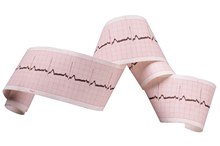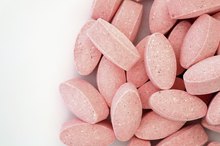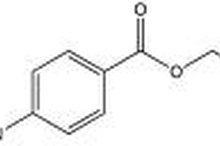What does fact checked mean?
At Healthfully, we strive to deliver objective content that is accurate and up-to-date. Our team periodically reviews articles in order to ensure content quality. The sources cited below consist of evidence from peer-reviewed journals, prominent medical organizations, academic associations, and government data.
The information contained on this site is for informational purposes only, and should not be used as a substitute for the advice of a professional health care provider. Please check with the appropriate physician regarding health questions and concerns. Although we strive to deliver accurate and up-to-date information, no guarantee to that effect is made.
Hydrogen Peroxide and Heart Rate
If you have ever shopped for health, beauty or cleaning items, chances are you have stumbled upon hydrogen peroxide (H2O2). Found in such products as chlorine-free bleaches, contact lens disinfectant solutions, fabric stain removers, first aid wound treatments or "hyper-oxygenation therapy" treatments, H2O2 has unquestionable usefulness in daily life. Yet scientific literature shows that it can also have damaging effects on various organs, including the heart.
If you are experiencing serious medical symptoms, seek emergency treatment immediately.
Description
Hydrogen peroxide (H2O2) belongs to a class of compounds called “reactive oxygen species” (ROS). Whenever they come into contact with organic matter, ROS strongly react and decompose into oxygen and water. What makes hydrogen peroxide stand out among ROS, however, is its relative chemical stability, small size and the fact that it easily crosses biological membranes. Simply put, it doesn't take long for your body to feel the effects of hydrogen peroxide, especially when it is present in high doses.
- Hydrogen peroxide (H2O2) belongs to a class of compounds called “reactive oxygen species” (ROS).
- What makes hydrogen peroxide stand out among ROS, however, is its relative chemical stability, small size and the fact that it easily crosses biological membranes.
Cardiovascular Effects
Health Risks of Exposure to Fire Extinguisher Chemicals
Learn More
Many effects of hydrogen peroxide can cause cardiac dysfunction 2. For instance, studies reported in a 2007 issue of the Canadian Journal of Physiology and Pharmacology showed that hydrogen peroxide can cause heart rate disturbances, change the calcium content in your cells and activate certain proteins involved in cardiac metabolism 2. In addition, hydrogen peroxide may also contribute to heart dysfunction by disrupting the metabolism of glucose,
Effects on Blood Pressure and Heart Rate
In a 2009 issue of the American Journal of Physiology, U.S. and Brazilian scientists reported that hydrogen peroxide in the brain’s nucleus tractus solitarus (NTS) induces hypotension, or low blood pressure, and slows heart rate 1. The NTS is the main brain site from which incoming nerve signals from your cardiovascular system travel to other areas of your brain. The NTS therefore plays an important role in controlling heart function, including your heart rate.
Bradycardia
Why Is Water Important in a Balanced Diet?
Learn More
Bradycardia is the medical term for slow heart rate. According to the American Heart Association, the adult resting heart normally beats at a rate of 60 to 80 beats per minute, although athletes can have a lower heart rate and be healthy 3. Cardiac muscle cells called myocytes are responsible for the regular, organized way your heart beats. However, your brain ultimately controls the electro-chemical signals that help myocytes trigger heart contractions. Bradycardia can cause various symptoms, including fainting, fatigue and dizziness.
- Bradycardia is the medical term for slow heart rate.
- According to the American Heart Association, the adult resting heart normally beats at a rate of 60 to 80 beats per minute, although athletes can have a lower heart rate and be healthy 3.
Mechanism of Action
Decades of research have led to the conclusion that ROS, such as hydrogen peroxide, can alter nerve activity in the brain. Specifically, U.S. and Brazilian scientists reported that hydrogen peroxide may slow your heart by tampering with the transmission of an important excitatory amino acid called L-glutamate. It may do so by inhibiting calcium-dependent L-glutamate release, by preventing certain brain cells from taking up L-glutamate or by directly blocking L-glutamate receptors.
Sources
Your body routinely produces small amounts of hydrogen peroxide (H2O2) in the course of its daily metabolic activities, hence the need for anti-oxidants to fend off serious damage. Researchers have noted, for instance, that several metabolic factors determine how much H2O2 the human brain produces. The degree of activation of L-glutamate receptors is one of those factors. You can also find hydrogen peroxide solutions in most types of stores, including health food stores and pharmacies. Manufacturers express the strength of a solution as a percentage or volume.
- Your body routinely produces small amounts of hydrogen peroxide (H2O2) in the course of its daily metabolic activities, hence the need for anti-oxidants to fend off serious damage.
Considerations
Commercially available solutions of hydrogen peroxide vary in strength, or concentration. For instance, a 1 percent H2O2 solution releases 3.3 volumes of oxygen. According to the International Programme on Chemical Safety, hydrogen peroxide poisoning has mild effects on most people 4. However, there have been reports of deaths with H2O2 ranging from 30 percent to 40 percent concentration. A key to your safety is therefore the product's concentration.
- Commercially available solutions of hydrogen peroxide vary in strength, or concentration.
- However, there have been reports of deaths with H2O2 ranging from 30 percent to 40 percent concentration.
Related Articles
References
- American Journal of Physiology: "Cardiovascular Responses to Hydrogen Peroxide into the Nucleus Tractus Solitarius"; Leonardo Ma´ximo Cardoso et al.; 2009
- Canadian Journal of Physiology and Pharmacology: Hydrogen Peroxide Causes Cardiac Dysfunction Independent from Its Effects on Matrix Metalloproteinase-2 Activation; Hernando Leon et al.; Volume 85; 2007
- American Heart Association: Arrhythmias
- International Programme on Chemical Safety: Hydrogen Peroxide
Resources
Writer Bio
Suzanne Fantar has been writing online since 2009 as an outlet for her passion for fitness, nutrition and health. She enjoys researching and writing about health, but also takes interest in family issues, poetry, music, Christ, nature and learning. She holds a bachelor's degree in biological sciences from Goucher College and a MBA in healthcare management from the University of Baltimore.








